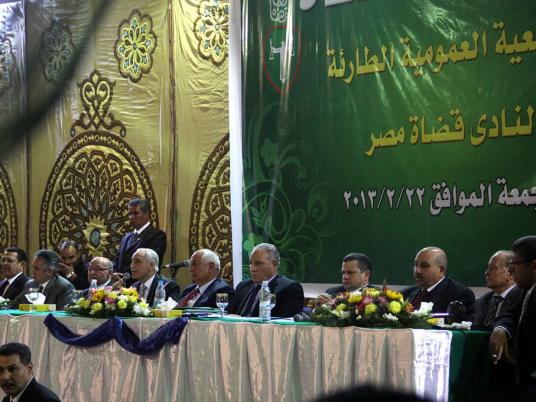The crisis surrounding the newly-announched amendments to the judicial authority bill escalated on Wednesday as the advisory council of judges' clubs held an emergency meeting to announce measures against the new bill.
In a Wednesday meeting, judges agreed to file a complaint directly to President Abdel Fattah al-Sisi about the bill, said Abdel Aziz Abu Ayana, head of the Alexandria Judges Club and chairman of the Judges Clubs Advisory Council. They also called for the withdrawal of the bill which was passed by the Parliament and awaits Sisi's approval to be put into effect.
Abu Ayana added that the judges preferred to not call for an emergency general assembly of judges, but rather to try and contain the crisis first with the president.
Samir al-Bahi, chairman of the State Council Judges Club, said the amendments were an attempt to place the judicial authority under another authority's control. Bahi added that upon the new bill, reports from security authorities will play a bigger role in the selection of chairpersons for judicial bodies.
On the other hand, Bahaa Abu Shaqqa, chairman of the Parliamentary Constitutional and Legislative Committee, said the Parliament has exercised its powers in accordance to the Constitution by passing the bill.
The Parliament's decision on Sunday to approve the draft amendments to the Judicial Authority Law, regarding how heads of judicial bodies are appointed, ignited a state of anger and resentment among masses of judges across all official bodies.
The feud was initially sparked when the Parliament approved on Monday a new draft law on the Judicial Authority, which includes amendments to some articles of the laws regulating the State Council, the State Lawsuits Authority (SLA) and the Administrative Prosecution Authority (SIS). This came despite some MPs' objection to discussing the law without handing out of copies prior, which would have given them a chance to study it.
The Parliamentary Legislative Committee approved the amendments earlier the same day, referring them for discussion at the evening general session. These were then approved and sent them to State Council to revise them and draft a report for the Parliament.
Some MPs objected on the speed at which the bill was dicussed and passed, without informing the judicial authorities of the details of the amendments introduced by the parliamentary committee.
The new draft law reportedly stipulates that the president will appoint the heads of the judiciary authorities by a decision, choosing from among the three vice-chairmen of each judicial body, nominated by the supreme council of that body from among the oldest seven deputies.
Judges called the law a violation of the independence of the judiciary and a waste of stable norms and traditions in choosing the head of each body according to the rule of seniority and not the choice as stipulated in the new amendments introduced to the law.
The new method comes contrary to the old system, by appointing the head of an authority who has the absolute seniority — a concept considered by Egypt's Judges Club as "one of the principles and legal constants established, and one of the guarantees of the independence of the judiciary" to ensure that no official interferes in the selection of the president of the Court of Cassation.
Edited translation from Al-Masry Al-Youm





